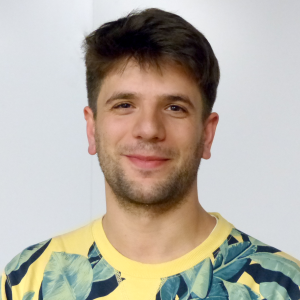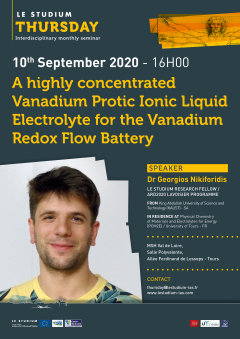Dr Georgios Nikiforidis

Établissement d'origine
King Abdullah University of Science and Technology (KAUST) - SA
Laboratoire d'accueil
Hôte Scientifique
Prof. Mérièm Anouti
PROJETS
1/ Batterie à flux redox au vanadium (RFB) avec un électrolyte liquide ionique (IL)/H2O
Nous étudions ici les performances du RFB au vanadium en présence d'un nouvel électrolyte, au pH proche de la neutralité. L'étude comprend la caractérisation physicochimique et électrochimique de l'électrolyte pour les côtés positif et négatif de la batterie. Dans une dernière étape, l'optimisation des paramètres de la batterie (débit, concentration, membrane, électrodes) sera effectuée pour obtenir un système RFB robuste à long terme.
2/ Batterie NaS semi-fluide avancée à température intermédiaire
A la recherche d'une capacité supérieure et d'une plus longue durée de vie pour le système de batterie IT NaS, nous mettons ici en œuvre des additifs thiol et disulfure au catholyte. Les propriétés physico-chimiques et électrochimiques des électrolytes seront caractérisées et mises en œuvre dans une batterie tubulaire pour les tests et l'optimisation.
Publications
Final reports
A protic ionic liquid is inctroduced for the first time as a solvent for a high energy density vanadium redox flow battery. The proof-of-concept redox flow cell with a concentration of 3 mol L−1 vandyl sulfate electrolyte was tested for a total of 30 cycles at 40°C, showing an open circuit potential of 1.38 V, a nominal capacity of 1900 mAh at a current density of 40 mA cm−1 and energy and coulombic efficiencies of 64 and 90%, respectively. The continuous 16 hours of cycling suggest that the concentrated anolyte and catholyte are thermally stable and cycleable. This study underlines a new route to improve the energy-to-volume ratio of this promising energy storage system.

